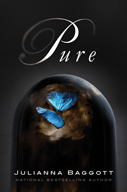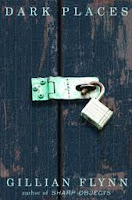I read two very dark stories in the same week. They were different genres: dystopian YA versus contemporary mystery. Both featured damaged protagonists. One kept me glued to the page. The other found me skimming to see how it ended without engaging me along the way.

The first was Julianna Baggott’s Pure. The dystopian setting is depressingly bleak. It takes place in a post-apocalyptic world where people have been fused to objects. Her world-building through choice of details made the story interesting and kept me reading. I can’t say I enjoyed it. It was tragic all the way through with no happy moments. The third person omniscient narrator traveled between co-protagonists, Pressia and Partridge, at a remove. The verbal camera also encompassed secondary characters that never fully came to life. They served as pawns to move the story forward. I never really felt a connection to the main characters, though I felt sympathy for their plight. None of the information reveals about how the story world developed were surprising. The terrible choice the heroine made at the end was treated almost clinically. I didn’t sense the anguish she should have felt. The ending was left open for a sequel.
Writers interested in learning more about world-building and unique vision should read Pure.

The second book was Gillian Flynn’s Dark Places. Her rich, narrative voice made the story fascinating to read. The protagonist is a child damaged by the murder of her family (allegedly by her brother). She was sympathetic yet tragic. I could appreciate why she turned out the way she did: a thief, a liar, a user. The story’s theme about exploiting the murder of others is strong. Flynn addressed the way survivors are cast into the spotlight and quickly forgotten and the macabre people who fixate on murders. The question of whether her brother committed the murders or not kept me turning pages to get to the truth. Four credible suspects were presented. The verbal camera moved between brother Ben, via third-person close up, the mother Patty via third person close up, the protagonist Libby via first person. In the end, the mystery was solved. I didn’t like the alternative last minute fifth suspect. There is one weird deviation to his POV at the end which didn’t add anything for me.
Writers interested in captivating narrative voice and page-turning, effective information reveals should read Dark Places.
You can learn as much from what you disliked about books as what you loved about them. Read both.
Opening lines are difficult to craft well. That’s why they should usually be left until the revision layers. Why, you ask? Because you could spend a year of Sundays trying to craft the perfect sentence instead of writing the rest of the manuscript.
Opening sentences are crucial in Chapter One. They give your reader a taste of what is to come. They are worthwhile in the rest of your chapters if you are willing to invest the time. A good opening sentence raises a question or poses a challenge the reader can’t walk away from.
Closing sentences are equally important. They are what keep your readers turning the page to read one more chapter, then another and another until they reach the end. The final chapter’s final line should stick with your reader, offering them one last finger lick of deliciousness to polish off the fiction plate.
Let’s take a look at a few examples from books on my To Be Read pile. Which would you read first?
The Devil’s Bones, Larry D. Sweazy
Opening Line: “Tito Cordova sat on the porch steps, staring at the barren tomato field and empty migrant shacks across the road. Everyone had left for Florida, or Mexico, to spend the winter. He hugged his knees to his chest, trying to keep warm.”
Closing line: “Welcome home, Tito. Welcome home.”
We start with Tito; we end with Tito. The story comes full circle.
Never Tell, Alafair Burke
Opening Line: “It has been twenty years, but at three-fourteen this morning I screamed in my sleep. I probably would not have known I had screamed were it not for the nudge from my husband — my patient, sleep-starved husband, who suspects but can never really know the reasons for his wife’s night terrors, because his wife has never truly explained them.”
Closing Line: “George had said not all questions needed to be answered, but maybe some questions didn’t need to be asked. Maybe she was still getting to know herself after all.”
We begin with an unanswered question and end with the thematic statement that not all questions should be asked.
Dark Places, Gillian Flynn
Opening Line: I have a meanness inside me, real as an organ. Slit me at my belly and it might slide out, meaty and dark, drop on the floor so you could stomp on it.
Closing Line: I didn’t want to meet him, and I didn’t want to introduce myself. I just wanted to be some woman, heading back home to Over There That Way.
We begin with a ghoulish description. The ending sentence probably makes sense once you've read the book. It would have worked better for me if it had also been suitably ghoulish. However, both lines are in the main character's unique voice.
The Sounds of Broken Glass, Deborah Crombie
Opening Line: He sat on the steps of the house in Woodland Road, counting the bank notes he’d stored in the biscuit tin, all that was left of his mum’s wages. Frowning, he counted again. Ten pounds short. Oh, bloody hell. She’d found the new stash and pilfered it again.
Closing Line: He felt as if he were sleepwalking. Slowly he picked up the envelope, lifted the unsealed flap, and eased out a single sheet of paper. It was a letter of transfer. And his chief superintendent had signed it.
This book begins with backstory and ends with a line offering a view into the main character's future. The last line works better for me than the first, though the first line hints at a problem.
The Other Woman, Hank Phillippi Ryan
Opening Line: “Get that light out of my face! And get behind the tape. All of you. Now.'"Detective Jake Brogan pointed his own flashlight at the pack of reporters, its cold glow highlighting one news-greedy face after another in the October darkness.
Closing Line: Jane smiled as she picked up her tote bag. I have a story to cover. “They obviously made a mistake.”
The opening and closing lines are uttered by different characters but reference the eagerness of reporters.
Read through your completed manuscript. Write down the first and last lines of each chapter. Are they intriguing? Can you make them stronger?





